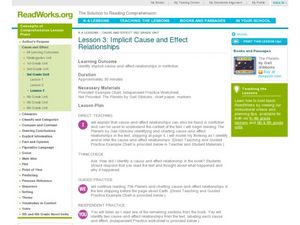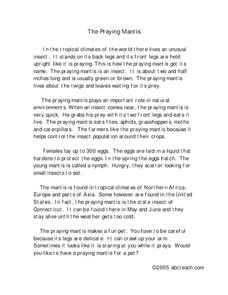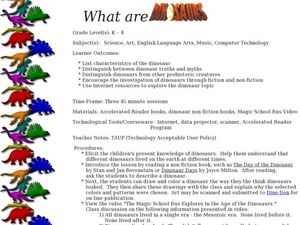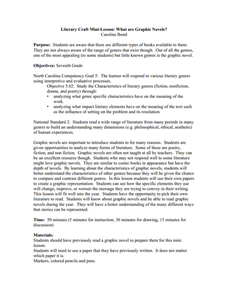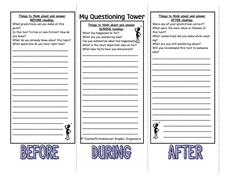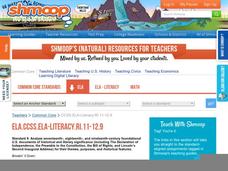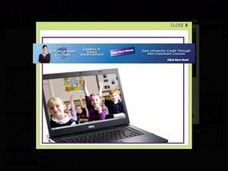Curated OER
"Spelldown" by Becky Mushko
Learners read Spelldown, by Becky Mushko and consider how it portrays the Appalachian community. They define and discuss vocabulary presented in the story and write a comparison/contrast paper analyzing two of the story's characters. The...
National Center for Case Study Teaching in Science
A Strange Fish Indeed
Communication is one of the most important aspects of science. In a two-day activity, your high school or college-level biologists will read excerpts from a fictional diary of Marjorie Courtenay-Latimer, the woman who discovered the...
Curated OER
A River Ran Wild: An Environmental History
The Nashua River serves as the focal point of an investigation of the treatment of and care for natural resources. A reading of A River Rand Wild: An Environmental History by Lynne Cherry, launches the study and class members consider...
Curated OER
Reading Multicultural Literature
Students read several fictional pieces which examine issues of urbanization and rural cultures. They discuss how the place a person lives affects the kind of person they become.
Curated OER
Let's Sum It All Up
Fourth graders watch a modeled lesson on summarizing the main ideas of a non-fiction passage. They silently read a passage about sharks before making a class summarization chart. Next, they read a small passage and summarize it...
Curated OER
Keep It Short!
Students examine the process of summarizing text. They participate in a class discussion, and read an assigned passage from their textbook, highlighting the main points of the text. Students then write a short summary of their...
Curated OER
Parts of a Story
Students read a short fiction book and demostrate comprehension by identifying the main characters, setting, conflict, theme, and summarizing the main points. They organize the information in Inspiration and create a powerpoint to show...
Curated OER
Implicit Cause and Effect Relationships
Cause and effect relationships can be found in both fiction and non-fiction texts. As they read the book, The Planets by Gail Gibbons, learners keep an eye out for cause and effect relationships. They chart all of the causes and effects...
Curated OER
The Praying Mantis
In this praying mantis reading comprehension worksheet, students read a 5 paragraph non-fiction selection about the insect and test their reading comprehension as they answer 7 multiple choice questions based on the reading.
Curated OER
Identify and Analyze Literary Concepts
Young scholars explore plot structure, conflict, setting, and mood. In this literary elements lesson, students read Rosa Parks, My Story and complete the provided plot outline worksheets. Young scholars discuss the text elements of...
Curated OER
From Fact to Fiction: The Origins of Constellations
Sixth graders investigate the constellations. In this constellations lesson, 6th graders discover where the constellations are located and the myth associated with them. Students create their own myth and make a slide show about stars...
Curated OER
What are Dinosaurs?
Students explore the attributes of dinosaurs. For this dinosaur lesson, students read books and watch videos featuring dinosaurs. Students also research dinosaur traits using Internet sources.
Curated OER
Minty
Students investigate, read, and discuss about other famous Afro-American leaders. Students compare/contrast slaves home, activities, etc. with that of Afro- Americans today. Students create a time line to post on the wall of Harriet's...
Curated OER
Author In The Spotlight
Complete an in-depth study of the works or a specific author. Working in pairs, young scholars read at least four works by the same author. After completing the reading, they create an essay comparing and contrasting the works and create...
Curated OER
Build Mastery: Cause and Effect
After you've begun identifying the cause and effect relationship within literature, it's time to give scholars some independent practice. Review the concept before handing out this graphic organizer. Learners use the book they are...
Appalachian State University
What Are Graphic Novels?
To do this engaging and pleasurable activity, your learners should have already read a graphic novel, and produced a piece of writing that can be reproduced into the format of a graphic novel. This exercise provides a script that...
Teacher Printables
My Questioning Tower
Good readers think about what they are reading. They ask questions and make predictions before beginning a text. While reading, they summarize what has happened and note what they have discovered. After finishing, they check to see if...
Curated OER
Author's Purpose
Sixth graders brainstorm the reasons authors write, and they list their responses on the board. Students discuss each purpose they have listed.Students work independently to read the selection "Tarantulas and Typhoid" by Stephanie Moss....
Curated OER
Book It to Pizza Hut
Students participate in reading a story and writing a book report on the computer. They engage in computer skills such as, saving and printing their reports. They read their reports to the teacher and class.
Shmoop
ELA.CCSS.ELA-Literacy.RI.11-12.9
Guided by close-reading questions, groups examine the similarities and differences between the Declaration of Independence and the Bill of Rights. In addition, they look at how the principles are presented in these two foundational US...
Curated OER
Book Buffet
Students are encouraged to develop a love for reading by sampling different types of literature. They are encouraged to read one of the books that is sampled. The sample should be challenging for the reader without causing discouragement.
Curated OER
Comparing Themes Across Texts
Read various texts to compare the themes across each text. Learners write a journal entry describing the most beautiful scenery they've seen and use a map of the United States to locate the Sequoia National Park and Muir Woods. They then...
Curated OER
Imagination Or Observation?
Read the books, "Frog and Toad Are Friends," and "Tale of a Tadpole," to distinguish between fantasy and reality in the books. In this reading comprehension lesson plan, students review the similarities and differences in each book with...
Shmoop
ELA.CCSS.ELA-Literacy.RI.11-12.3
Make analyzing the sequence of events in an informational text easy. Ask readers to craft a one-sentence summary of each paragraph in a document and create a text map. To demonstrate their understanding of the process, participants read...
Other popular searches
- Non Fiction Reading Passages
- Reading Non Fiction
- Reading Non Fiction
- Active Reading Non Fiction
- Shared Reading Non Fiction
- Reading Non Fiction Text
- Non Fiction Reading Pre Test
- Non Fiction Reading Skills
- Non Fiction Reading Journal
- Non Fiction Reading Logs
- Lesson Non Fiction Reading
- Non Fiction Reading Lessons









